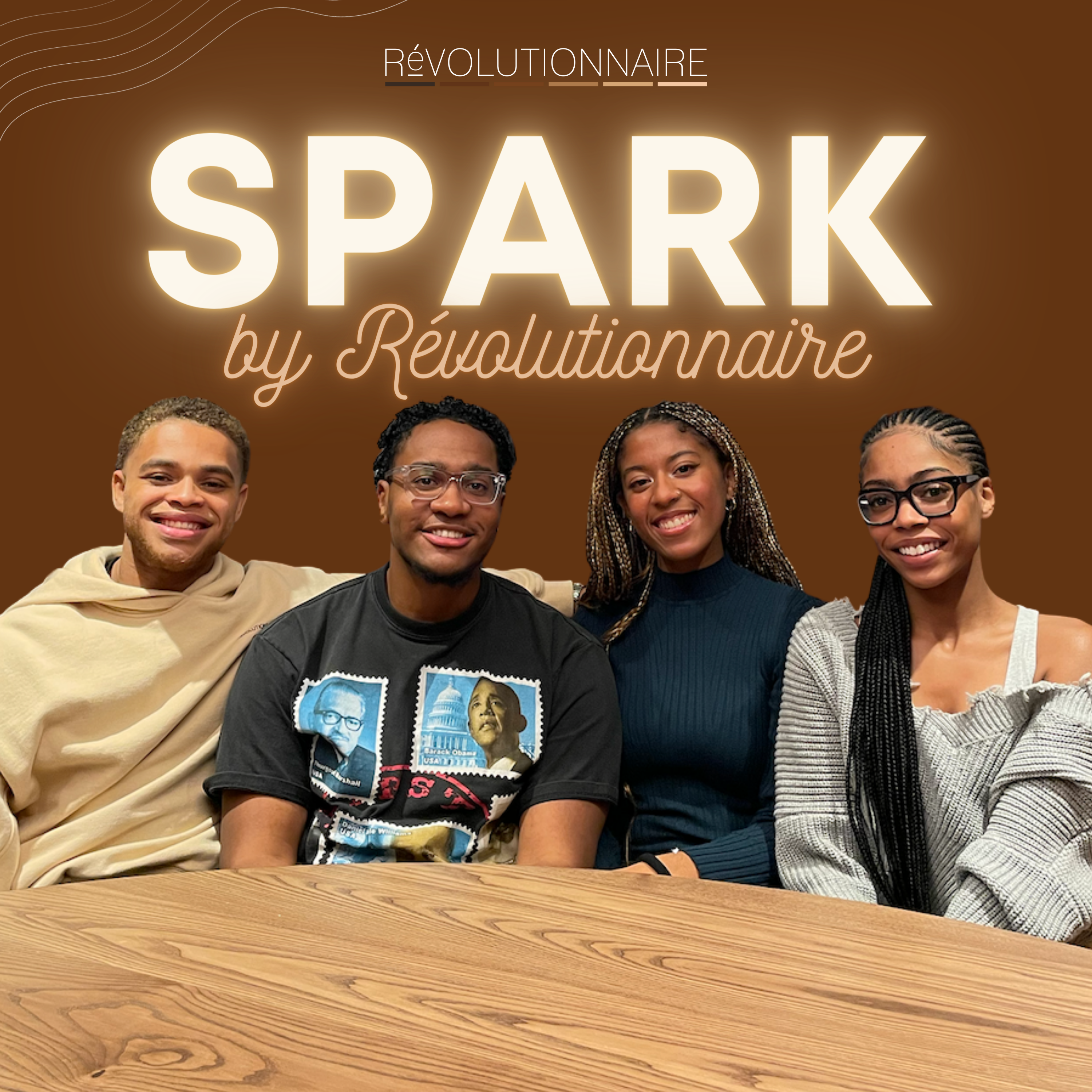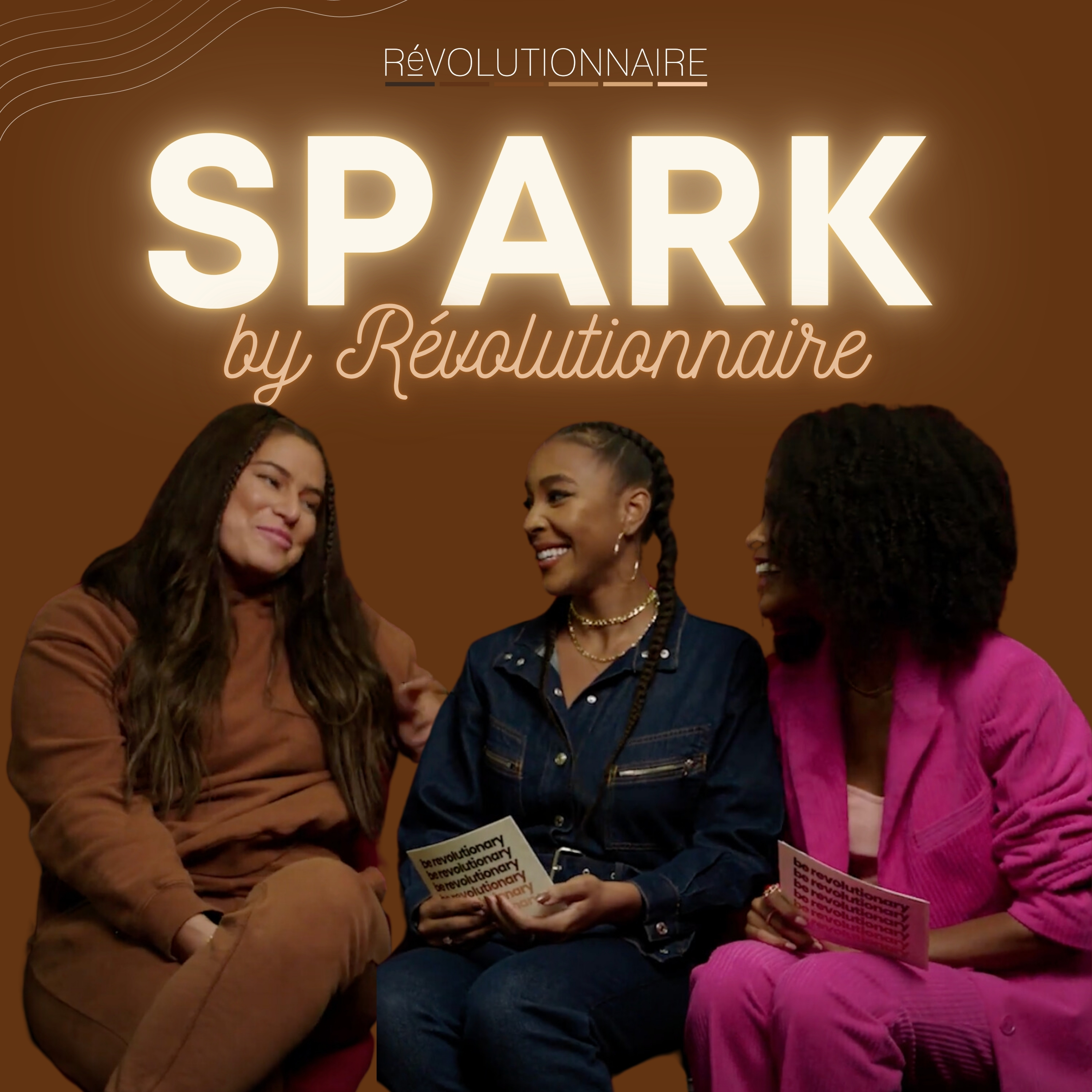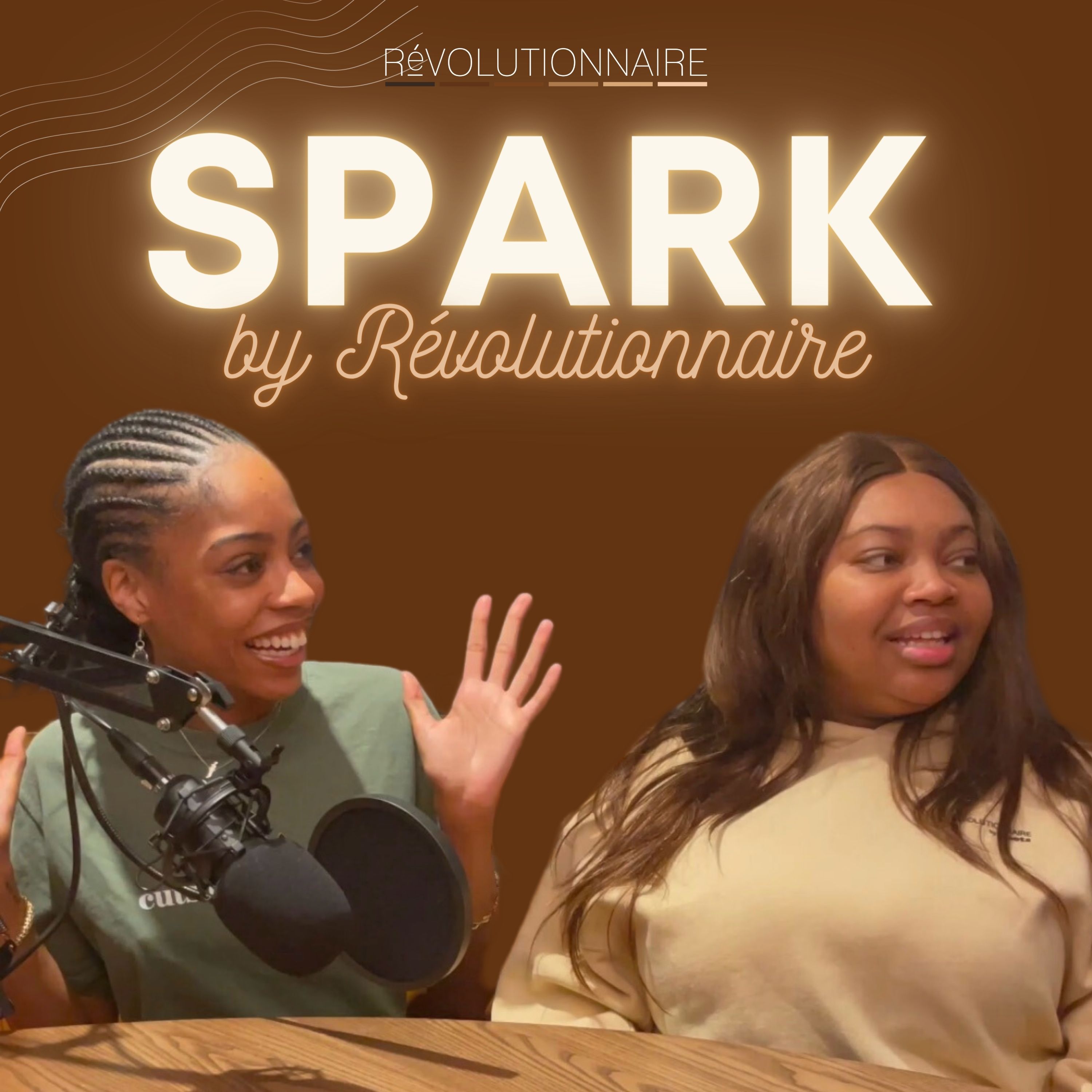Episode Transcript
[00:00:02] Speaker A: Welcome to a special be revolutionary episode.
[00:00:04] Speaker A: Of Spark by Revolutionnaire.
[00:00:06] Speaker A: I'm Justice.
[00:00:07] Speaker B: And I'm Nia. And we're the co founders of Revolutionnaire and co hosts of Be Revolutionary. And today we'll be speaking about diversity, equity, and inclusion in sports with Elladj, Balde and Skate Global foundation.
[00:00:18] Speaker C: Not only is Elladj introducing new styles and elements into the sport, but it's also changing the face of figure skating. By championing inclusivity as well as mental health and climate justice with skate global.
[00:00:29] Speaker B: Foundation, he is revolutionizing the world of skating for years to come.
[00:00:33] Speaker C: Truly so excited for this interview. We've been following you for such a long time, and. No, seriously, and always so mesmerized by.
[00:00:40] Speaker A: Each of your videos.
[00:00:41] Speaker A: Because whether it's the landscape, the song.
[00:00:43] Speaker A: The choreography, you're taking it to the next level every single time, quite literally.
[00:00:48] Speaker A: What inspired you to first begin to.
[00:00:50] Speaker A: Disrupt the sport of figure skating?
[00:00:51] Speaker D: I was tired of being confined to the mold of what figure skating looks like or what it needs to be. I was tired of my voice being suppressed. As an artist, I wanted to do things that felt authentic to me, and I felt like for so many years, I wasn't able to do that because I needed to be a certain way in order to be successful. So when the idea came to me to just be who I am on the ice and celebrate all of the things that are different about me, that's when I started operating differently. And my intention was to really share.
[00:01:22] Speaker E: That with the world.
[00:01:22] Speaker B: So beautiful. And oftentimes, as athletes and artists, we're told to focus on our sport or our art more so than what happens off the rink, off the court, off the field, or outside of the studio. But it seems like for you, it's always gone beyond figure skating and always been bigger than just your performance. What inspired you to go beyond the traditional role of a figure skater and not only lead all of these super cool movements that you do on the ice, but also lead a broader movement for equity within the sport?
[00:01:49] Speaker E: That's a really great question. I think what inspired me to use my voice on social media is because I think for so many years, as athletes, we're trained and taught to do your sport, practice, eat, sleep, and that's it. Go and perform. Basically, we're robots. And I think that throughout the years, we started to realize that as athletes, we have incredibly powerful voices. One of the best examples for me is Muhammad Ali. The way he used his fame from being the best in the sport, he used that to change the way society was moving forward. And I think for me, as an athlete and as someone that has a platform, it's integral to use my voice to potentially help shift things in a different way, or at least be a voice for the people that haven't had the opportunity to use their voice or that have been silenced. And I think it's my duty. And a lot of athletes are taking that route now, and I think it's an incredibly powerful one, because sports are microcosms of society. And so if we're able to use our sports to share a message, I think society can shift in a more positive way.
[00:02:58] Speaker A: Your videos are set in some of the most picturesque landscapes in the world. A constant reminder of our planet's natural beauty. And we know that one of skate Global Foundation's core pillars is climate change. Can you tell us a bit about what your organization is doing to help save the planet and what others can do as well?
[00:03:14] Speaker C: Right now, one of the main things that we're doing is just that is raising awareness on the fact that these beautiful places exist. Those lakes do freeze, but we're not sure for how long it will continue to freeze. There might be a time where the seasons are getting shorter and shorter, and so there might be places in the world where these lakes don't exist anymore. So showing the beauty that we have on planet Earth, I think it's one of the main missions that we have is raising that awareness. And then throughout different actions, we're trying to find ways to have impact on sharing with people. What are the ways that you can, on your own, do things to reduce your carbon footprint? I've done a lot of actions myself throughout the years. I've educated myself a lot. And I think if we all take a step towards educating ourselves and taking actions, it could be as small as not taking a plastic bag from the grocery store. Things like that can be transformational in so many ways. And so trying to find ways to raise awareness on what are the ways that we can reduce the waste that we produce on our planet is extremely important.
[00:04:25] Speaker A: I love that so much because we always say that change starts with being informed. Right. And your commitment to raising awareness about really tangible steps that people can take is so incredibly impactful.
[00:04:35] Speaker B: Absolutely. And with mental health as another pillar of skate global foundation, what does your mental health journey look like and what is your advice for others?
[00:04:44] Speaker C: I think we've all been through periods of our lives when we've struggled with mental health. So mental health, I think for me and for a lot of people in our society now has been something that is becoming more and more important. And as athletes, it's something that is so crucial because your mental health is important to your results and your performance and how you show up every single day. And being able to help athletes with access to sports psychologists or therapists or people that can help them process difficult emotions or prepare for competitions, is something that can not only help them in their skating careers, but also can help them in their personal lives. And it's a mission that's really important to me, my wife and the organization. Those are great questions.
[00:05:36] Speaker A: Thank you. So you'll often hear saying that dreams fuel revolutions, which inspires the next question. How have your dreams evolved over the course of your journey, and what are your dreams for the future?
[00:05:46] Speaker C: I think my dreams have evolved in so many different ways.
One of the most powerful ways is in the idea that I could carve my own path. As a figure skater, you're very limited with the amount of opportunities that you have outside of figure skating when you retire. But with this newfound path of social media, not only am I able to continue to do what I love in a much more authentic way, but I'm also able to share my story, raise awareness, be representation for the next generation of black, indigenous and people of color. And so this idea of being able to carve my own path, a path that didn't exist before for me, is something that is extremely powerful. And I want to spread that message as well to everyone that there is a way to carve your own path. If you don't see yourself somewhere, if you don't see yourself in a specific field, then maybe there's a way for you to carve your path and get there in a way that is different than everyone else's. And I believe that the more that we can continue as a society to do that, so many different opportunities will show up, and hopefully we'll see a lot more diversity in places that we haven't seen them in the past.
[00:06:59] Speaker B: That is so powerful. And it sounds like your authenticity has really pivoted your path towards more passion and more purpose, which is just so inspiring for us.
[00:07:09] Speaker C: Thank you. That means a lot.
[00:07:11] Speaker B: You face injuries and challenges in your career, but what has continued to tie you to your dreams for yourself, to continue upping your game and bring more.
[00:07:20] Speaker A: People into the sport?
[00:07:21] Speaker E: What really ties me to all the hopes and dreams that I have for the sport is really this idea that I was able to change my relationship to failure. I was able to change my relationship to something that I used to perceive as negative. But throughout my experiences, I've learned that failures are stepping stones towards success.
They're a roadmap to evolving and growing. And so when I decided to take every opportunity that I had, positive or negative, and try to dissect them and find the ways to grow within that experience, it allowed me to realize that I can always evolve and I can always dream, and there's always hope. Because even the negatives and the failures turn out to be something beautiful in the end. And that, I think, is the reason why I'm able to stay within the sport and continue to not only exist within it, but thrive now.
[00:08:20] Speaker A: So tell us about Skate Global foundation. How did the organization come to be? What's your mission? And how can others support?
[00:08:26] Speaker C: The Skate Global foundation is built under three pillars. The first one is EDI. Equity, diversity, inclusion, mental health. And the third one is climate crisis. And every project that we do falls under one of these three pillars. And right now, since the beginning of November 2021, when we founded the foundation, we've been focusing on EDI because that's the space that we feel like right now, we can have the most impact. We feel like the conversation is being had, and this is where we can create the most genuine change, use the momentum that's been created in the last couple of years to create as much change as possible within that space.
We've worked previously in working with a construction company, trying to upgrade and build rinks in underserved communities to help create access in those communities, because a lot of rinks that exist are in middle class and upper class communities. But the ones in underserved communities aren't as functional or nonexistent. But moving forward in 2023, one of the biggest projects and initiatives that we have is helping skaters of color that are within the sport right now and helping them with grants, funding, equipment. Because skating is an extremely expensive sport, a lot of people get priced out of the sport. I myself almost didn't continue skating because my parents were unable to afford figure skating. And so if we're able to come and help skaters on their journey throughout their season, with travel, coaching, bills, ice time, equipment, and funding, we're able to ease a little bit their season and reduce some of that pressure of needing to perform. And then without that pressure, they're going to be able to be out there and not only enjoy themselves, but create really incredible memories and perform on the highest level that they can. We have a website, theskglobalfoundation.com, where people can donate and get more information about what we do and what the plans are for 2023.
[00:10:25] Speaker A: Thank you so much for joining us today. I can't wait to get out on the ice.
[00:10:28] Speaker C: I can't wait. I'm going to teach you backflips, so be better.
[00:10:32] Speaker A: Yeah, we'll see about that. We really appreciate it.
[00:10:34] Speaker B: We're so inspired by all the incredible work that you're doing and honor to.
[00:10:38] Speaker A: Be able to speak with you today.
[00:10:39] Speaker C: Thank you so much for having me. It was an honor for me as well.
[00:10:43] Speaker A: To learn more about elage and Skate Global foundation, head to www. Joinrev.
[00:10:48] Speaker C: Co hey, y'all, make sure that y'all stay tuned for more episodes for sparked.
[00:10:53] Speaker B: By Révolutionaire and follow us on TikTok and Instagram at revolutionaire. Co.


